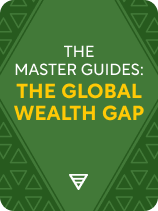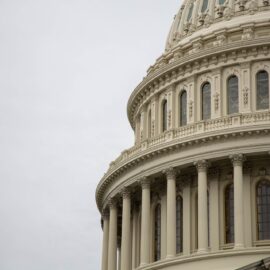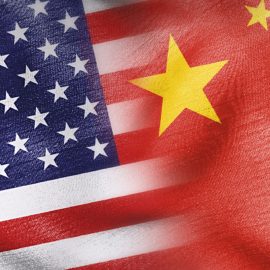

This article is an excerpt from the Shortform book guide to "The Master Guides: The Global Wealth Gap" by Shortform. Shortform has the world's best summaries and analyses of books you should be reading.
Like this article? Sign up for a free trial here.
How do politics affect the economy of a nation? What internal and external political factors could be in operation?
Of course, geography and culture impact a country’s economy. But, politics also play a significant role. When we examine the global wealth gap, we must consider political factors from inside and outside a nation that contribute to its wealth or poverty.
Continue reading to learn how politics make a difference in a nation’s economy.
How Politics Affect the Economy
How do politics affect the economy of a nation? Some analysts suggest that certain types of governments, laws, and political norms are conducive to success while others lead to poverty. In particular, they focus on three main elements of government: market regulation, corruption, and internal stability.
Instead of studying the differences between nations, some analysts focus on how nations interact to explain the global wealth gap. Specifically, they view exploitation—nations taking advantage of others for their own benefit—as the main cause of international inequality. Put simply, they argue that rich nations often become rich by taking wealth away from poorer nations. They focus on two main methods of exploitation: violent force and political pressure.
Let’s take a look at all five of these ways that politics affect the economy of a nation.
#1: Market Regulation
Some authors argue that the use or misuse of market regulations—the way a government manages and controls its economy—can lead a nation to success or poverty. In Why Nations Fail, economist Daron Acemoglu and political scientist James A. Robinson argue government regulation of the economy is crucial for success. Specifically, they say regulations must create an economic environment that is fair, competitive, and easy to enter into. Under these circumstances, people are able to put their ideas on the market and the best ideas will be able to succeed. This economy of good ideas encourages technological development, which increases efficiency to create more wealth.
Acemoglu and Robinson explain that to create this economic environment, the government must enforce property rights and contracts, split up monopolies, and provide high-quality public services like schools and roads. This evens the economic playing field enough that anyone with a good idea can succeed.
#2: Corruption
Some experts also note that varying levels of government corruption—politicians using their positions for their personal economic gain—also contribute to international inequality. Paul Collier (The Bottom Billion) argues that corrupt governments tend to impoverish their nations by prioritizing loyalty over competence and personal gain over broad economic success. For example, say a nation needs a new train station to transport goods and people more efficiently. Corrupt government officials hire their own political allies to build the station and overpay them to ensure their loyalty, or award building contracts to whoever pays the biggest bribe regardless of their qualifications. This makes the train station simultaneously worse and more expensive.
Acemoglu and Robinson (Why Nations Fail) note that corruption often discourages development, preventing economic growth. Corrupt governments often intentionally discourage development because large changes in the economy—shifting away from natural resources, for example—might threaten to shift economic and political power away from them.
#3: Internal Stability
Finally, several authors argue that the global wealth gap also results from some nations being embroiled in conflict, whether they are under attack, engaged in a civil war, or otherwise unable to maintain a functional government. Acemoglu and Robinson (Why Nations Fail) explain that in an unstable country, people have no incentive to generate wealth since no government can guarantee they’ll keep what they make. Collier (The Bottom Billion) makes a similar argument, pointing out that instability causes people, investors, and their money to leave a nation altogether.
#4: Violent Force
Acemoglu and Robinson (Why Nations Fail) explain that the most direct way nations exploit one another is through violent force. This can be as simple as one nation declaring war on another to try and secure economic benefits, or as complex as one nation establishing a network of colonies across the globe to extract wealth from elsewhere. Either way, one nation uses violence to benefit at the expense of another, creating or widening inequality.
William Easterly (The White Man’s Burden) discusses how colonial governments established by European nations in Asia, Africa, and South America created political and economic problems that still exist long after decolonization. Europeans imposed arbitrary borders that ignored the ethnic, linguistic, and religious makeup of a given area and purposefully heightened ethnic tensions to divide and conquer colonial populations. Many of these divisions remain today and are responsible for ongoing conflicts and civil strife that impact those nations’ economies. In addition, colonies had political and economic institutions designed around slavery and harsh working conditions—institutions whose economic consequences are still felt today.
#5: Political Pressure
Nations can also use subtler forms of political and economic pressure to exploit one another. For example, author and activist Naomi Klein’s The Shock Doctrine explores “economic shock therapy,” where the United States used political and economic influence to force other nations into mass privatization—selling public services and industries to private owners at very low prices. The main benefactors of economic shock therapy were foreign corporations who were able to buy formerly public services for little money or speculate on vast market shifts. Meanwhile, nations that underwent shock therapy often became more impoverished as social safety nets and jobs were cut to minimize public spending and maximize corporate profits.
For example, when Indonesia’s economy was on the verge of collapse in the 1990s, the International Monetary Fund would only offer to loan the nation money if they adopted a number of free-market reforms, causing unemployment to skyrocket and massively increasing inequality within the country. Then, multinational corporations bought up large amounts of stock in Indonesian companies to profit off of the nation’s economic troubles—causing so much social unrest that the people eventually rose up and deposed their government.

———End of Preview———
Like what you just read? Read the rest of the world's best book summary and analysis of Shortform's "The Master Guides: The Global Wealth Gap" at Shortform.
Here's what you'll find in our full The Master Guides: The Global Wealth Gap summary:
- A look into why some nations are poor while others are rich
- What causes the global wealth gap and whether or not it can be closed
- How natural resources often make a nation poor, not rich






